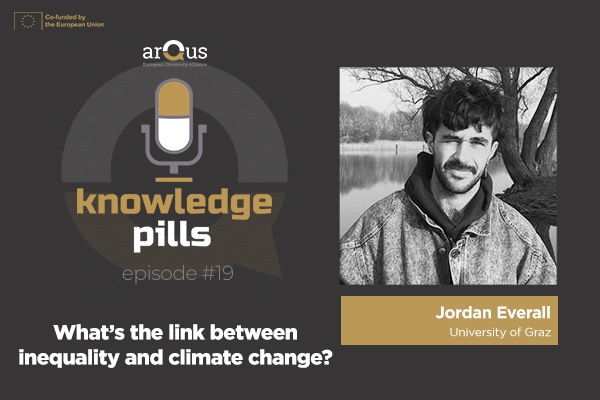For the 19th episode of the Arqus Knowledge Pills, we welcomed an expert on “social tipping”: Jordan Everall. He is a member of the research group “Social Complexity & System Transformation” at the University of Graz.
Social tipping processes describe how social, political, economic or technological systems can move rapidly into a new system state if cascading positive feedback mechanisms are triggered.
In this episode, we discuss his research on rapid social change and its connection to climate change. Jordan explains also how to quantify inequality and how these topics are all connected before he answers the tricky question: “Is it still possible to save the Earth?”.
Learn more about Jordan Everall:
Jordan was born in Australia, studied his bachelor’s there, and then moved to Berlin at the end of his Master’s in Environmental Science to finish it at the Frei Universität in Berlin. After this he worked as a research assistant in areas that included agricultural modelling and techno-economic assessment, the latter being at PIK (Potsdam Institute für Klima..). He decided after working at PIK and attending a lecture from Ilona Otto there that he would like to do his PhD in the area of social tipping, and more broadly social transformation, but from a modelling or quantitative perspective, which brought him to what he is currently doing.
Jordan researches social tipping and rapid social transformation processes using the tools of network science and agent-based modelling. In doing this he focuses on inequality in the ability of individuals to initiate or facilitate these processes, or their Agency. Whether it be the ultra-wealthy, social-media influencers, politicians, or your average Jane. This inequality in the agency is often influenced by wealth, status, and occupation, which also require consideration. In addition to quantifying these differences, he wants to find out how we can use those with more influence as a lever in society, and speed these processes up.
The episodes of the “Arqus Knowledge Pills” are published on a regular basis and can be subscribed to on Spotify and other platforms (see below). Doriane Duvault (Université Claude Bernard Lyon 1) and Josephine Petzold (Leipzig University) are the moderators that lead listeners through each episode.
